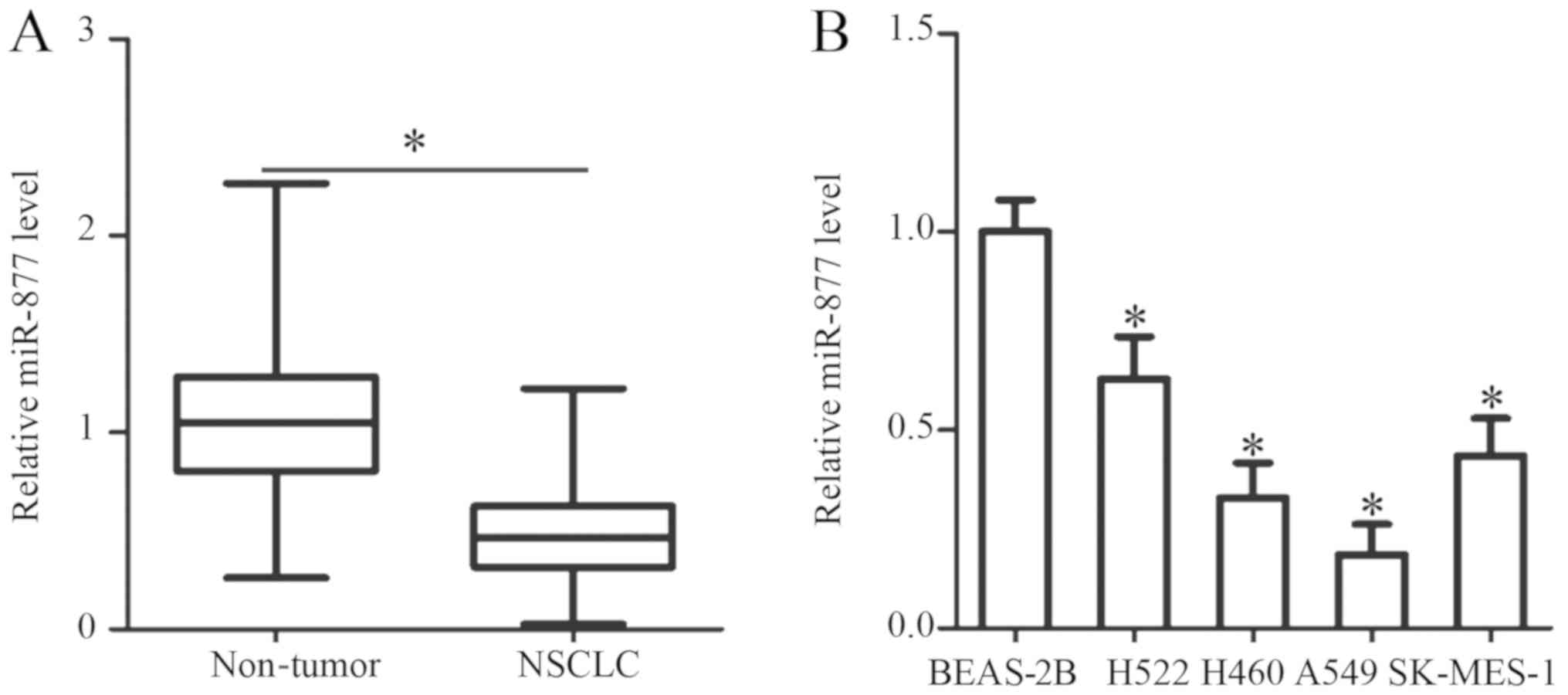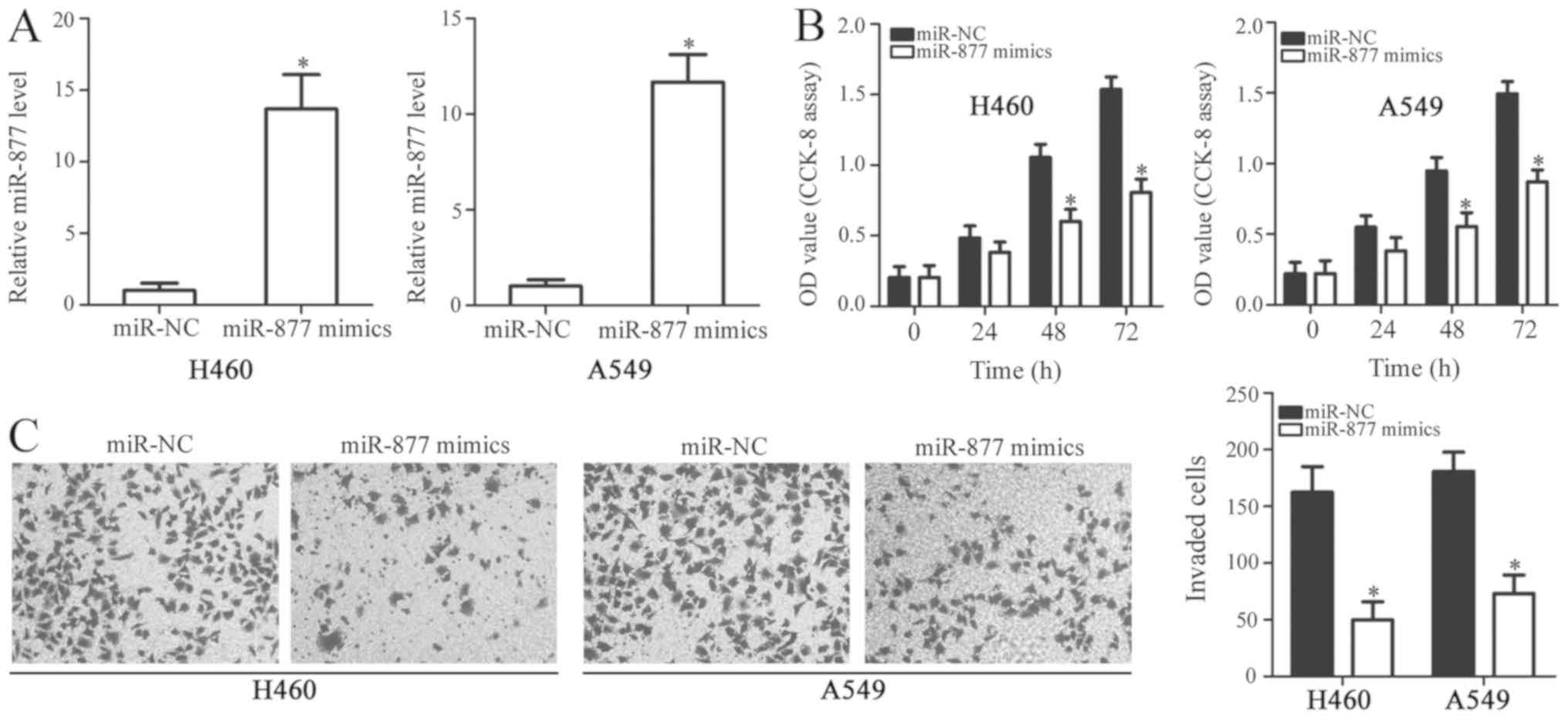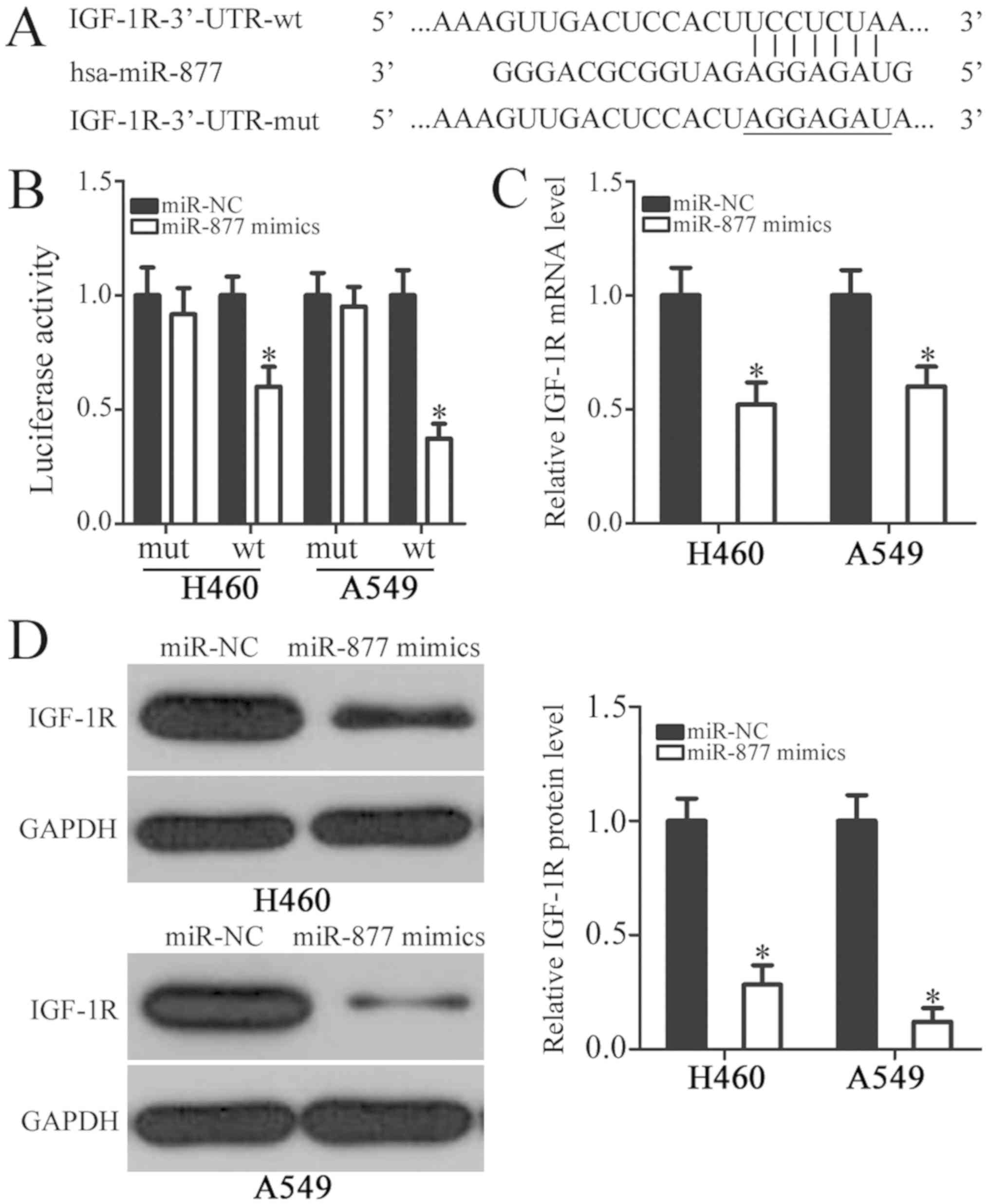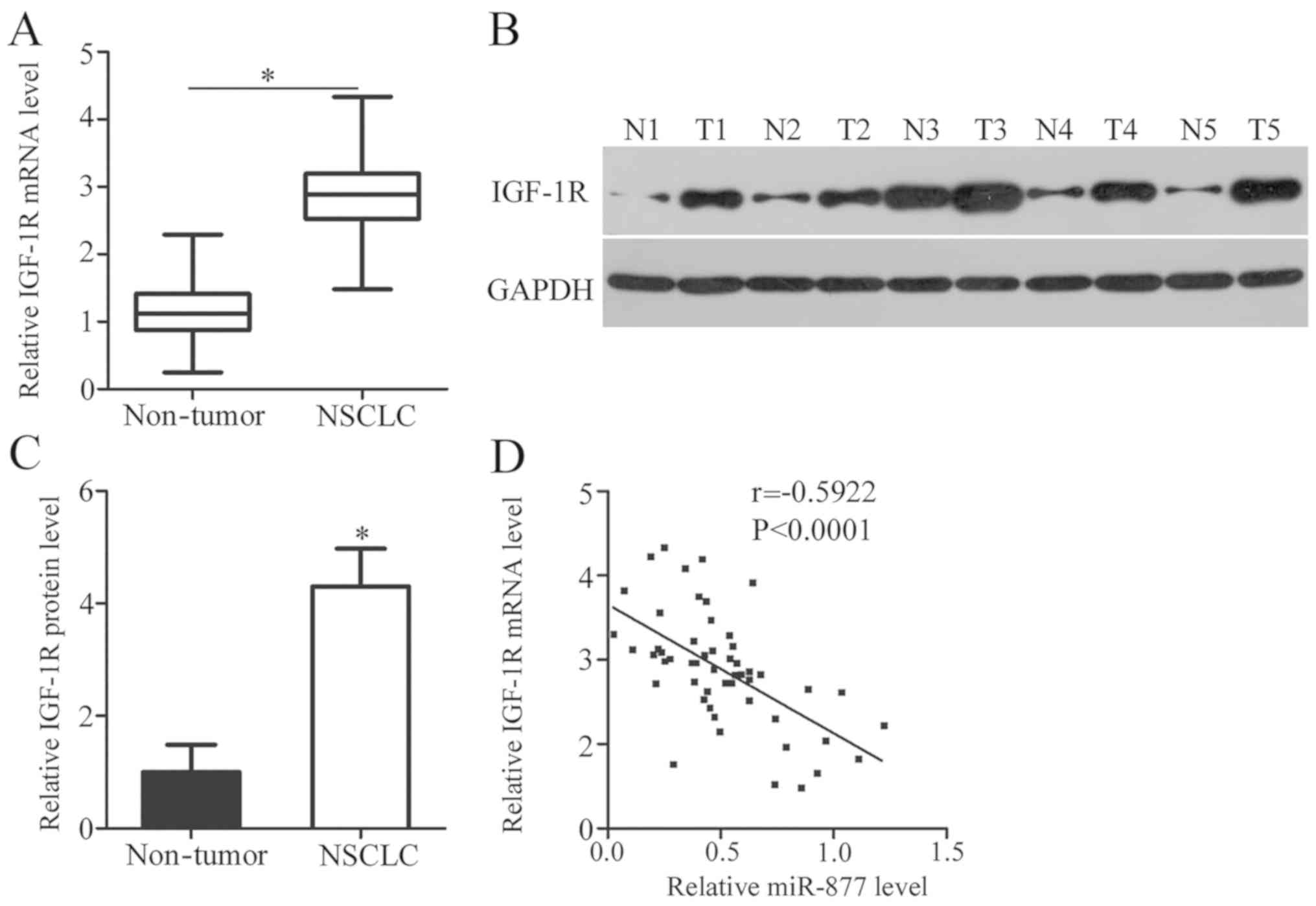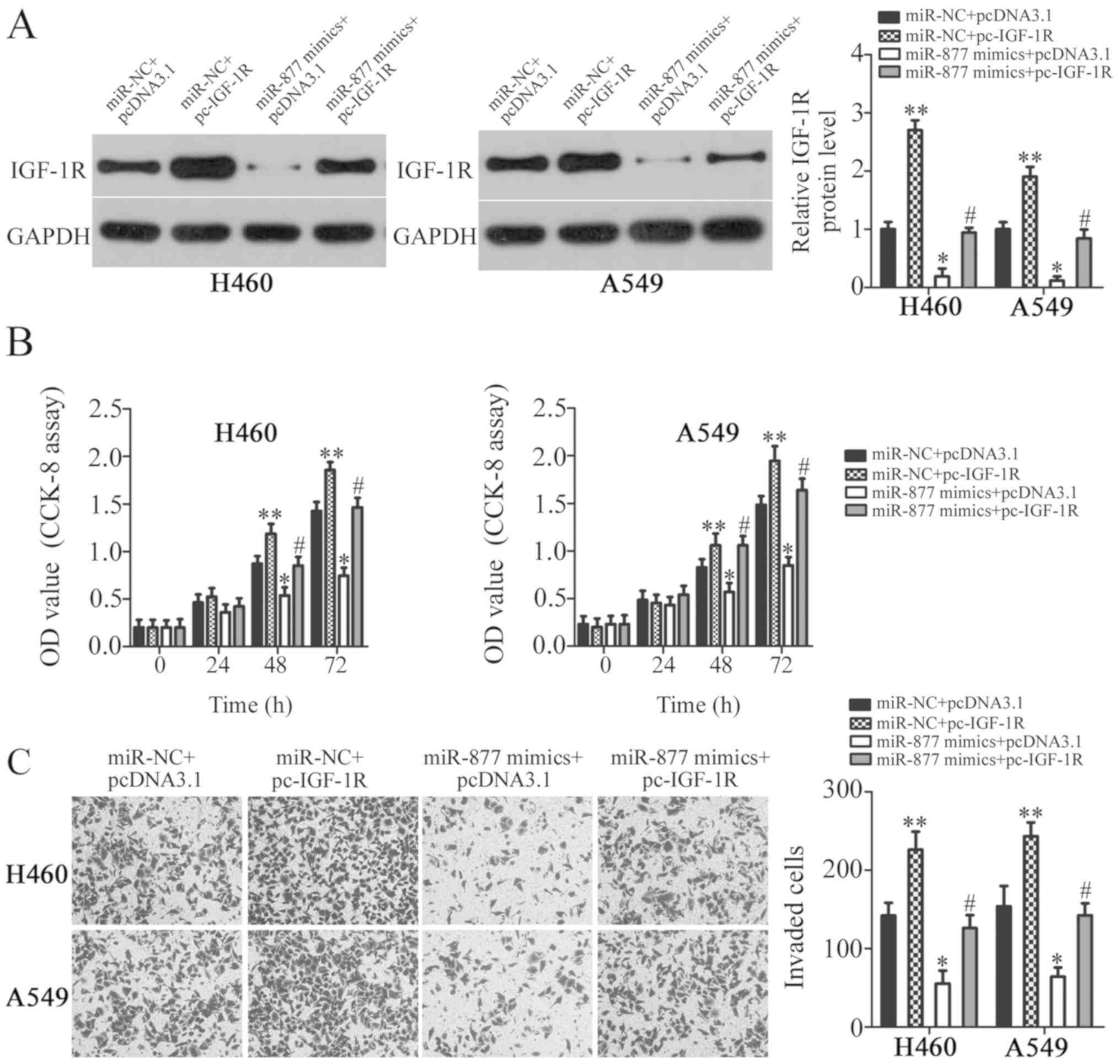|
1
|
Molina JR, Yang P, Cassivi SD, Schild SE
and Adjei AA: Non-small cell lung cancer: Epidemiology, risk
factors, treatment, and survivorship. Mayo Clin Proc. 83:584–594.
2008. View
Article : Google Scholar : PubMed/NCBI
|
|
2
|
Ferlay J, Soerjomataram I, Dikshit R, Eser
S, Mathers C, Rebelo M, Parkin DM, Forman D and Bray F: Cancer
incidence and mortality worldwide: Sources, methods and major
patterns in GLOBOCAN 2012. Int J Cancer. 136:E359–E386. 2015.
View Article : Google Scholar : PubMed/NCBI
|
|
3
|
Zheng M: Classification and pathology of
lung cancer. Surg Oncol Clin N Am. 25:447–468. 2016. View Article : Google Scholar : PubMed/NCBI
|
|
4
|
Ettinger DS, Akerley W, Bepler G, Blum MG,
Chang A, Cheney RT, Chirieac LR, D'Amico TA, Demmy TL, Ganti AK, et
al: Non-small cell lung cancer. J Natl Compr Canc Netw. 8:740–801.
2010. View Article : Google Scholar : PubMed/NCBI
|
|
5
|
Goldstraw P, Crowley J, Chansky K, Giroux
DJ, Groome PA, Rami-Porta R, Postmus PE, Rusch V and Sobin L;
International Association for the Study of Lung Cancer
International Staging Committee; Participating Institutions, : The
IASLC lung cancer staging project: Proposals for the revision of
the TNM stage groupings in the forthcoming (seventh) edition of the
TNM Classification of malignant tumours. J Thorac Oncol. 2:706–714.
2007. View Article : Google Scholar : PubMed/NCBI
|
|
6
|
Steeg PS: Metastasis suppressors alter the
signal transduction of cancer cells. Nat Rev Cancer. 3:55–63. 2003.
View Article : Google Scholar : PubMed/NCBI
|
|
7
|
Link A and Kupcinskas J: MicroRNAs as
non-invasive diagnostic biomarkers for gastric cancer: Current
insights and future perspectives. World J Gastroenterol.
24:3313–3329. 2018. View Article : Google Scholar : PubMed/NCBI
|
|
8
|
Ramassone A, Pagotto S, Veronese A and
Visone R: Epigenetics and MicroRNAs in Cancer. Int J Mol Sci.
19(pii): E4592018. View Article : Google Scholar : PubMed/NCBI
|
|
9
|
Pratap P, Raza ST, Abbas S and Mahdi F:
MicroRNA-associated carcinogenesis in lung carcinoma. J Cancer Res
Ther. 14:249–254. 2018.PubMed/NCBI
|
|
10
|
Macfarlane LA and Murphy PR: MicroRNA:
Biogenesis, function and role in cancer. Curr Genomics. 11:537–561.
2010. View Article : Google Scholar : PubMed/NCBI
|
|
11
|
Bartel DP: MicroRNAs: Genomics,
biogenesis, mechanism, and function. Cell. 116:281–297. 2004.
View Article : Google Scholar : PubMed/NCBI
|
|
12
|
Altana V, Geretto M and Pulliero A:
MicroRNAs and physical activity. Microrna. 4:74–85. 2015.
View Article : Google Scholar : PubMed/NCBI
|
|
13
|
Lu J, Zhan Y, Feng J, Luo J and Fan S:
MicroRNAs associated with therapy of non-small cell lung cancer.
Int J Biol Sci. 14:390–397. 2018. View Article : Google Scholar : PubMed/NCBI
|
|
14
|
Shishodia G, Verma G, Das BC and Bharti
AC: miRNA as viral transcription tuners in HPV-mediated cervical
carcinogenesis. Front Biosci (Schol Ed). 10:21–47. 2018. View Article : Google Scholar : PubMed/NCBI
|
|
15
|
To KK, Tong CW, Wu M and Cho WC: MicroRNAs
in the prognosis and therapy of colorectal cancer: From bench to
bedside. World J Gastroenterol. 24:2949–2973. 2018. View Article : Google Scholar : PubMed/NCBI
|
|
16
|
Sharma N and Baruah MM: The microRNA
signatures: Aberrantly expressed miRNAs in prostate cancer. Clin
Transl Oncol. 21:126–144. 2019. View Article : Google Scholar : PubMed/NCBI
|
|
17
|
Piasecka D, Braun M, Kordek R, Sadej R and
Romanska H: MicroRNAs in regulation of triple-negative breast
cancer progression. J Cancer Res Clin Oncol. 144:1401–1411. 2018.
View Article : Google Scholar : PubMed/NCBI
|
|
18
|
Fadejeva I, Olschewski H and Hrzenjak A:
MicroRNAs as regulators of cisplatin-resistance in non-small cell
lung carcinomas. Oncotarget. 8:115754–115773. 2017. View Article : Google Scholar : PubMed/NCBI
|
|
19
|
Zhou Q, Huang SX, Zhang F, Li SJ, Liu C,
Xi YY, Wang L, Wang X, He QQ, Sun CC and Li DJ: MicroRNAs: A novel
potential biomarker for diagnosis and therapy in patients with
non-small cell lung cancer. Cell Prolif. 50:e 123942017. View Article : Google Scholar
|
|
20
|
Yan TH, Qiu C, Sun J and Li WH: MiR-877-5p
suppresses cell growth, migration and invasion by targeting cyclin
dependent kinase 14 and predicts prognosis in hepatocellular
carcinoma. Eur Rev Med Pharmacol Sci. 22:3038–3046. 2018.PubMed/NCBI
|
|
21
|
Huang X, Qin J and Lu S: Up-regulation of
miR-877 induced by paclitaxel inhibits hepatocellular carcinoma
cell proliferation though targeting FOXM1. Int J Clin Exp Pathol.
8:1515–1524. 2015.PubMed/NCBI
|
|
22
|
Shi Q, Xu X, Liu Q, Luo F, Shi J and He X:
MicroRNA-877 acts as a tumor suppressor by directly targeting eEF2K
in renal cell carcinoma. Oncol Lett. 11:1474–1480. 2016. View Article : Google Scholar : PubMed/NCBI
|
|
23
|
Woodard GA, Jones KD and Jablons DM: Lung
cancer staging and prognosis. Cancer Treat Res. 170:47–75. 2016.
View Article : Google Scholar : PubMed/NCBI
|
|
24
|
Livak KJ and Schmittgen TD: Analysis of
relative gene expression data using real-time quantitative PCR and
the 2(-Delta Delta C(T)) method. Methods. 25:402–408. 2001.
View Article : Google Scholar : PubMed/NCBI
|
|
25
|
Ludovini V, Bellezza G, Pistola L,
Bianconi F, Di Carlo L, Sidoni A, Semeraro A, Del Sordo R,
Tofanetti FR, Mameli MG, et al: High coexpression of both
insulin-like growth factor receptor-1 (IGFR-1) and epidermal growth
factor receptor (EGFR) is associated with shorter disease-free
survival in resected non-small-cell lung cancer patients. Ann
Oncol. 20:842–849. 2009. View Article : Google Scholar : PubMed/NCBI
|
|
26
|
Cappuzzo F, Tallini G, Finocchiaro G,
Wilson RS, Ligorio C, Giordano L, Toschi L, Incarbone M, Cavina R,
Terracciano L, et al: Insulin-like growth factor receptor 1 (IGF1R)
expression and survival in surgically resected non-small-cell lung
cancer (NSCLC) patients. Ann Oncol. 21:562–567. 2010. View Article : Google Scholar : PubMed/NCBI
|
|
27
|
Kim YH, Sumiyoshi S, Hashimoto S, Masago
K, Togashi Y, Sakamori Y, Okuda C, Mio T and Mishima M: Expressions
of insulin-like growth factor receptor-1 and insulin-like growth
factor binding protein 3 in advanced non-small-cell lung cancer.
Clin Lung Cancer. 13:385–390. 2012. View Article : Google Scholar : PubMed/NCBI
|
|
28
|
Tsuta K, Mimae T, Nitta H, Yoshida A,
Maeshima AM, Asamura H, Grogan TM, Furuta K and Tsuda H:
Insulin-like growth factor-1 receptor protein expression and gene
copy number alterations in non-small cell lung carcinomas. Hum
Pathol. 44:975–982. 2013. View Article : Google Scholar : PubMed/NCBI
|
|
29
|
Gately K, Forde L, Cuffe S, Cummins R, Kay
EW, Feuerhake F and O'Byrne KJ: High coexpression of both EGFR and
IGF1R correlates with poor patient prognosis in resected
non-small-cell lung cancer. Clin Lung Cancer. 15:58–66. 2014.
View Article : Google Scholar : PubMed/NCBI
|
|
30
|
Zhao S, Qiu Z, He J, Li L and Li W:
Insulin-like growth factor receptor 1 (IGF1R) expression and
survival in non-small cell lung cancer patients: A meta-analysis.
Int J Clin Exp Pathol. 7:6694–6704. 2014.PubMed/NCBI
|
|
31
|
Nakagawa M, Uramoto H, Oka S, Chikaishi Y,
Iwanami T, Shimokawa H, So T, Hanagiri T and Tanaka F: Clinical
significance of IGF1R expression in non-small-cell lung cancer.
Clin Lung Cancer. 13:136–142. 2012. View Article : Google Scholar : PubMed/NCBI
|
|
32
|
Vilmar A, Santoni-Rugiu E, Cillas JG,
Huarriz M and Sørensen JB: Insulin-like growth factor receptor 1
mRNA expression as a prognostic marker in advanced non-small cell
lung cancer. Anticancer Res. 34:2991–2996. 2014.PubMed/NCBI
|
|
33
|
Liu F, Liu Y, Liu X, Mao K, Zhong D,
Marcus AI, Khuri FR, Sun SY, He Y and Zhou W: Inhibition of IGF1R
enhances 2-deoxyglucose in the treatment of non-small cell lung
cancer. Lung Cancer. 123:36–43. 2018. View Article : Google Scholar : PubMed/NCBI
|
|
34
|
Yeo CD, Kim YA, Lee HY, Kim JW, Lee SH,
Kim SJ, Kwon SS, Kim YH and Kim SC: Inhibiting IGF-1R attenuates
cell proliferation and VEGF production in IGF-1R over-expressing
EGFR mutant non-small cell lung cancer cells. Exp Lung Res.
43:29–37. 2017. View Article : Google Scholar : PubMed/NCBI
|
|
35
|
Zhao FY, Han J, Chen XW, Wang J, Wang XD,
Sun JG and Chen ZT: miR-223 enhances the sensitivity of non-small
cell lung cancer cells to erlotinib by targeting the insulin-like
growth factor-1 receptor. Int J Mol Med. 38:183–191. 2016.
View Article : Google Scholar : PubMed/NCBI
|
|
36
|
Wei YH, Tang HX, Liao YD, Fu SL, Xu LQ,
Chen G, Zhang C, Ju S, Liu ZG, You LK, et al: Effects of
insulin-like growth factor 1 receptor and its inhibitor AG1024 on
the progress of lung cancer. J Huazhong Univ Sci Technolog Med Sci.
35:834–841. 2015. View Article : Google Scholar : PubMed/NCBI
|
|
37
|
Min HY, Yun HJ, Lee JS, Lee HJ, Cho J,
Jang HJ, Park SH, Liu D, Oh SH, Lee JJ, et al: Targeting the
insulin-like growth factor receptor and Src signaling network for
the treatment of non-small cell lung cancer. Mol Cancer.
14:1132015. View Article : Google Scholar : PubMed/NCBI
|
|
38
|
Song L, Dai Z, Zhang S, Zhang H, Liu C, Ma
X, Liu D, Zan Y and Yin X: MicroRNA-1179 suppresses cell growth and
invasion by targeting sperm-associated antigen 5-mediated Akt
signaling in human non-small cell lung cancer. Biochem Biophys Res
Commun. 504:164–170. 2018. View Article : Google Scholar : PubMed/NCBI
|
|
39
|
Jiang W, Wei K, Pan C, Li H, Cao J, Han X,
Tang Y, Zhu S, Yuan W, He Y, et al: MicroRNA-1258 suppresses tumour
progression via GRB2/Ras/Erk pathway in non-small-cell lung cancer.
Cell Prolif. 51:e125022018. View Article : Google Scholar : PubMed/NCBI
|
|
40
|
Yang JZ, Bian L, Hou JG and Wang HY:
MiR-550a-3p promotes non-small cell lung cancer cell proliferation
and metastasis through down-regulating TIMP2. Eur Rev Med Pharmacol
Sci. 22:4156–4165. 2018.PubMed/NCBI
|
|
41
|
Iqbal MA, Arora S, Prakasam G, Calin GA
and Syed MA: MicroRNA in lung cancer: Role, mechanisms, pathways
and therapeutic relevance. Mol Aspects Med. Aug 17–2018.(Epub ahead
of print). View Article : Google Scholar : PubMed/NCBI
|
|
42
|
Rao C, Miao X, Zhao G, Zhang C, Shen H,
Dong C and Yang M: MiR-219a-5p enhances cisplatin sensitivity of
human non-small cell lung cancer by targeting FGF9. Biomed
Pharmacother. 114:1086622019. View Article : Google Scholar : PubMed/NCBI
|
|
43
|
Zhang MY, Lin J and Kui YC: MicroRNA-345
suppresses cell invasion and migration in non-small cell lung
cancer by directly targeting YAP1. Eur Rev Med Pharmacol Sci.
23:2436–2443. 2019.PubMed/NCBI
|
|
44
|
Li X, Zhu J, Liu Y, Duan C, Chang R and
Zhang C: MicroRNA-331-3p inhibits epithelial-mesenchymal transition
by targeting ErbB2 and VAV2 through the Rac1/PAK1/β-catenin axis in
non-small-cell lung cancer. Cancer Sci. Apr 7–2019.doi:
10.1111/cas.14014 (Epub ahead of print). View Article : Google Scholar
|
|
45
|
Hu Q, Gong JP, Li J, Zhong SL, Chen WX,
Zhang JY, Ma TF, Ji H, Lv MM, Zhao JH and Tang JH: Down-regulation
of miRNA-452 is associated with adriamycin-resistance in breast
cancer cells. Asian Pac J Cancer Prev. 15:5137–5142. 2014.
View Article : Google Scholar : PubMed/NCBI
|
|
46
|
Ge J and Chen Z, Wu S, Chen J, Li X, Li J,
Yin J and Chen Z: Expression levels of insulin-like growth factor-1
and multidrug resistance-associated protein-1 indicate poor
prognosis in patients with gastric cancer. Digestion. 80:148–158.
2009. View Article : Google Scholar : PubMed/NCBI
|
|
47
|
Ochnik AM and Baxter RC: Insulin-like
growth factor receptor and sphingosine kinase are prognostic and
therapeutic targets in breast cancer. BMC Cancer. 17:8202017.
View Article : Google Scholar : PubMed/NCBI
|
|
48
|
Maris C, D'Haene N, Trépant AL, Le Mercier
M, Sauvage S, Allard J, Rorive S, Demetter P, Decaestecker C and
Salmon I: IGF-IR: A new prognostic biomarker for human
glioblastoma. Br J Cancer. 113:729–737. 2015. View Article : Google Scholar : PubMed/NCBI
|
|
49
|
Tracz AF, Szczylik C, Porta C and
Czarnecka AM: Insulin-like growth factor-1 signaling in renal cell
carcinoma. BMC Cancer. 16:4532016. View Article : Google Scholar : PubMed/NCBI
|
|
50
|
Kim CK, Oh S, Kim SJ, Leem SH, Heo J and
Chung SH: Correlation of IGF1R expression with ABCG2 and CD44
expressions in human osteosarcoma. Genes Genomics. 40:381–388.
2018. View Article : Google Scholar : PubMed/NCBI
|















